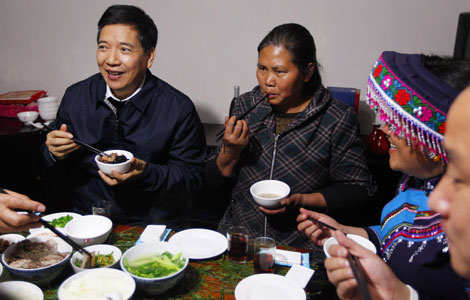|
|||||||||||
Hubei, Hunan, Jiangxi cooperation plan could benefit 90 million people
WUHAN - More than 90 million people will benefit from comprehensive business cooperation jointly launched by Hubei, Jiangxi and Hunan provinces, Li Hongzhong, Party chief of Hubei province, said on Friday.
Addressing a conference in Hubei's provincial capital Wuhan, Li said the agreement reached by leaders of the three provinces is a sign that cooperative efforts to establish a new urban hub in Central China have officially begun.
According to Li, the blueprint will strengthen business cooperation between three capital cities - Wuhan, Changsha and Nanchang - which form a natural triangle where more than 90 million people live, nearly 8 percent of China's population.
The zone had a total economic output of 2.5 trillion yuan ($397 billion) and maintained 7.3 percent of the country's gross domestic product in 2010.
More than 129 of the top 500 global companies have either investments or offices in the region, he said.
"The three provinces will work together to build a new urban hub, which will play a significant role in optimizing the region's productive forces," said Lu Xinshe, governor of Jiangxi.
Their cooperation "will greatly promote the economic development of the middle reaches of the Yangtze River", Lu said.
Wang Yuqi, director of the Jiangxi Academy of Social Sciences, said at the conference that the cooperation is expected to build a fourth significant urban hub in China, after the Bohai-Rim Economic Circle (Beijing-Tianjin-Tangshan); Yangtze River Delta (Shanghai-Nanjing-Hangzhou), and Pearl River Delta (Guangzhou-Shenzhen-Zhuhai).
"It can be estimated that competition among urban hubs will become more evident," said Wang.
The idea of building an economic zone in Central China was first raised in 2003 by Qin Zunwen, a professor of economics from the Hubei Academy of Social Sciences. "As long as the three provinces work together, a competitive urban hub is well in sight," Qin said.
In 2010, the State Council issued a regulation on the importance of developing urban hubs in the three provinces, providing a foundation for the close cooperation among the provinces.
Hunan and Hubei both contributed more than 1.9 trillion yuan in gross provincial product last year, according to provincial data, both overtaking Shanghai.
Wang Xiang, 29, a real estate project manager in Wuhan, said based on his experience, the investment environment in the city still needs improvement, compared with that in eastern coastal cities.
Wang Yan, 23, a Jiangxi woman who is studying in Wuhan, said that the transport system between the two regions is convenient. "We can travel back and forth within a day."
But some people say the initiative needs further discussion and study.
"Regional development should be in line with national strategy, so we support further discussion (about the cooperation)," said Fan Hengshan, director of the National Development and Reform Commission's regional economy department.
"The central cities are finally getting their chance," said Ye Yonggang, a professor of finance from Wuhan University. "But the success of the plan still depends on different factors."
Ye said effective cooperation is based on more than just an announcement. "The most important job is working out how to have each party get real benefit from the cooperation."
Hot Topics
Kim Jong-il, Mengniu, train crash probe, Vaclav Havel, New Year, coast guard death, Internet security, Mekong River, Strait of Hormuz, economic work conference
Editor's Picks

|

|

|

|

|

|







